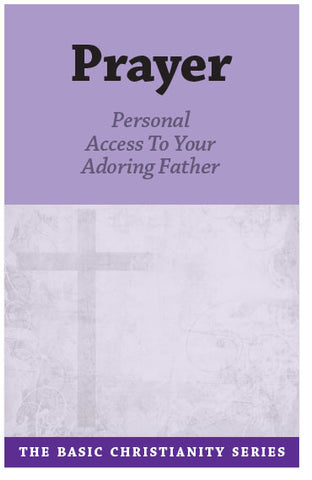How to Pray
Special-Order Folded Tract
 NOTE: This item is custom-printed to order (click for more details).
NOTE: This item is custom-printed to order (click for more details).
This tract is from our print-on-demand library, and is not kept in stock. Select the options below, and we will custom-print a batch just for you. Because this item is custom-printed, you can add your custom imprint to the back page at no extra cost.
- Estimated shipping date: Monday, June 2 (Click for more details)
- SKU:
- Discounts: Discount coupons do not apply to this item
- Format: Folded Tract
- Size: 3.5 inches x 5.5 inches
- Pages: 6
- Imprinting: Available with 5 lines of custom text
- Version: NIV
- Returns: Because this item is custom-printed to order, it cannot be returned.
Show all item details
The full text of this tract is shown below in the NIV version. (Do you want to print this tract in a different version than the one listed? Contact us and let us know what you're looking for—we may be able to create the alternate version for you at no charge.)
Do you know how to pray? What to pray for? When and where to pray? Why your prayers aren’t answered? If you are unsure about any of these things, you’re not alone: even Jesus’ disciples asked Him, “teach us to pray” (Luke 11:1).
First of all, do we even need to pray? I have heard people say that since God already knows all (Omniscient), and sees all (Omnipresent), and has power over everything (Omnipotent), then there is no need to pray to Him since He already knows what we’re going to say.
Unfortunately, this argument breaks down immediately because the Bible tells us that God wants us to “always pray and not give up” (Luke 18:1) as well as to “pray continually” (1 Thessalonians 5:17). The Bible has many examples of God acting on behalf of His people as the result of prayer. God expects us to pray. He tell us to pray!
What is Prayer?
Prayer is communicating with God. That may sound like a difficult thing, but with some Biblical guidelines and a little practice, prayer should become just as natural as having a conversation with your best friend.
In the Bible, prayer is always directed to God—it is absolutely unscriptural to pray to anyone else, such as “Mary,” or one of the other saints. Doing so is idolatry.
What Should We Avoid?
When Jesus taught His disciples how to pray, He first told them some things not to do (Matthew 6:5-8).
The first thing He said was that prayer is not a chance to make a show of how spiritual we are. Jesus described people who pray to get attention as “hypocrites” or fakes. His instruction was to go into a quiet, private place, and there pour out your heart to God.
The next instruction Jesus gave was to not simply repeat a prayer over and over. It is hugely ironic that many people have taken the example prayer He gave (“Our Father, which art in Heaven ...”) and done exactly that! When you pray you should always know what the words you are praying mean. Remember who you are talking to when you pray.
How Should We Pray?
After telling His disciples what not to do, Jesus moved on to give them an example of effective prayer: “This, then, is how you should pray: ‘Our Father in heaven, hallowed be your name, your kingdom come, your will be done, on earth as it is in heaven. Give us today our daily bread. And forgive us our debts, as we also have forgiven our debtors. And lead us not into temptation, but deliver us from the evil one’” (Matthew 6:9-13).
First, note that God is addressed as “Father.” Is God your Father? Are you saved—a born-again Christian? If you have turned to Him in repentance, trusting Jesus Christ as your personal savior, then you can call God your “Father.”
Next, see that prayer is more than just asking for what we want. Jesus began this prayer by praising God (“hallowed be your name”), and we should not neglect this example in our prayers.
When we do get around to making our requests, what should we ask for? We should ask for things that God would want us to have. One of the most important promises concerning prayer in the Bible is 1 John 5:14,15: “This is the confidence we have in approaching God: that if we ask anything according to his will, he hears us. And if we know that he hears us—whatever we ask—we know that we have what we asked of him.” However, if we just ask for things that we selfishly desire, God will not answer our prayers (James 4:3).
What Should We Pray For?
Knowing God’s will means knowing the Bible. It means we should know Scriptural examples of petitions made in prayer by Biblical men of God like Paul (Colossians 1:9-12), Jesus (John 17), Timothy (1 Timothy 2:1), and others. We should seek first the kingdom of God (Matthew 6:33) by praying for non-believers that they would come to Christ. We are told to pray for our leaders, those in authority over us (1 Timothy 2:1,2). Jesus also said to pray for those who may persecute us for our faith in Christ (Matthew 5:44).
Guidelines For Effective Prayer
Don’t mindlessly repeat anything! It’s a sin to do it.
Don’t ask for anything unless you really mean your request: “Put your heart into it.”
Always get right to the point and ask God for exactly what you want.
Qualify your request—give God a Scripturally-justifiable reason why you are asking it.
Give God a reason—again Scripturally-based reason—why He should answer it.
Always accompany your petitions (requests) with thanksgiving (Philippians 4:6; 1 Timothy 2:1).
Be persistent—if your answer doesn’t come immediately, keep praying! (Luke 18:1-7).
An effective Scriptural practice in prayer is giving God a reason for granting a petition (request) by calling Him to remembrance of Biblical promises, prophecies or commandments relevant to the petition(2 Chronicles 20:6-12).













